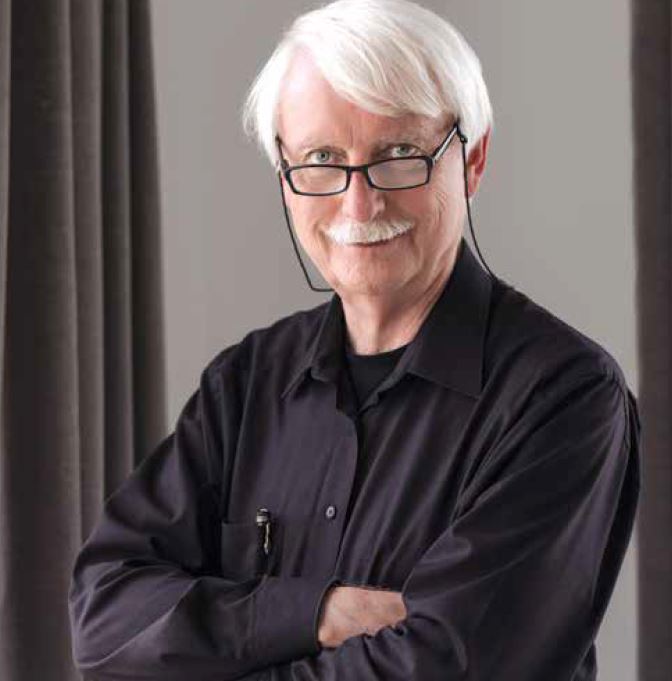Hearing Health Impacts Well-Being

Volusia Health Care News | Spring 2017 | West Volusia/Lake Mary Edition
Four years ago, Rudi E. Moerck, PhD, woke up on the morning of his birthday and didn’t hear his alarm. He had suffered a sudden loss of hearing in both ears.
Dr. Moerck was surprised that his hearing loss appeared so quickly, but not that his hearing was impaired. He attributed the decline to excessive noise exposure when he was younger.
“I grew up in the rock and roll era of the 60’s & 70’s,” he describes. “I probably suffered some hearing dam-age from attending concerts. I was also in ROTC, which is the military training in college. I participated in target shooting, and at that time, there was no hearing protection used.”
As a consultant and global speaker on nutrition and supplements, Dr. Moerck’s hearing is critical to his success and health. His hearing issues affected him in many ways. “With the sudden loss, I became irritable,” he remembers. “Because most hearing loss involves high frequencies, and females have a higher pitch to their voices than males, it was very hard to understand my wife. At work, it was difficult to understand employees and to hear in meetings. I had to do a lot of lip reading and asking people to repeat themselves.
“I thought the hearing loss might be some sort of condition, so I went to an ear, nose and throat specialist. He began a series of treatments that included large doses of prednisone. That did nothing, so I started looking around for a hearing aid specialist.”
Dr. Moerck searched for hearing aid specialists in the area who could meet his needs and narrowed his list down to five providers. He visited all five, but was impressed with only one. The one who stood out for his outstanding knowledge and exceptional patient care was Luis Guzman, BC-HIS, of Hearing Aid Lab.
“Some of the people I visited I consider fly-by-night discounters,” offers Dr. Moerck. “They did not have patient care to the level that Luis provided. Luis was the only one who was really comprehensive and patient oriented.”
Luis tested Dr. Moerck’s hearing and interviewed him thoroughly about his daily activities and his environments at home and at work. Luis was able to recommend a set of hearing aids that could benefit the doctor’s auditory needs and his lifestyle.
“When I got my first set of hearing aids, they worked very well,” says Dr. Moerck. “They helped me tremendously. Once I committed to them, I went back every two weeks. Luis would redo the hearing test and fine-tune the hearing aids. I was very pleased with the devices he fit for me.”
Gradual Process
Luis notes that when Dr. Moerck first arrived at Hearing Aid Lab, he was having issues communicating and interacting with the people around him. “As a consultant in his professional life, Dr. Moerck felt it was important to take care of his hearing loss,” recalls Luis. “He interviewed a few hearing aid dispensing companies and a few doctors, and he decided to come on board with us.”
Dr. Moerck suffered a sudden hearing loss, but that’s not how it generally happens. In most cases, hearing loss progresses gradually – so slowly that most people don’t even notice the change. “Even though the loss is an impairment, it’s what becomes normal to the patients,” states Luis. “They just know they’re not understanding conversations as well. They know they have to concentrate more to understand what’s going on around them.”
The professionals at Hearing Aid Lab recognize that because hearing loss happens gradually, the solution should be gradual as well. “When we introduce patients to amplification to bring back clarity and understanding, we don’t give them the full correction at one time,” explains Luis. “Patients can’t tolerate all that sound at once. It’s not normal to them, and it’s distorted.
“Rather, we slowly acclimate them to hearing again. Instead of setting them at the full amplification they need immediately, we break the process down into segments. This way, they can acclimate little by little, and we walk them up this path until we get them to normal hearing.”
Hearing may be just one of the body’s senses, but it has a tremendous impact on an individual’s total health. Luis points out that hearing health can dramatically affect a patient’s well-being. “Taking care of hearing health is not just for the hearing loss that people relate to; it also benefits one’s overall health,” says Luis. “Studies indicate that people who don’t deal with their hearing loss are at risk for anxiety and depression, and an earlier onset of Alzheimer’s disease and other dementias.”
Comfort and Quality
Dr. Moerck remembers getting his first set of hearing aids from Hearing Aid Lab four years ago. He noticed a difference in his hearing right away. “Luis told me to wear the hearing aids for a while and then he’d fine-tune them,” he remarks. “He’s got a computer system that can monitor the types of sounds to which I’m exposed, and then he can tweak the hearing aids to deal with certain situations. What’s most important to me is clarity in conversations.”
The docto r has been a patient of Luis since then. This year, Luis contacted Dr. Moerck and invited him to come back in and be retested. He hadn’t had an appointment for almost a year. “It turns out I’ve had a further loss in hearing,” shares Dr. Moerck. “We mutually decided that I needed more advanced hearing aids that have the speakers inside the ears, rather than hollow tubes with the speakers inside the hearing aids on the outside of my ears.
r has been a patient of Luis since then. This year, Luis contacted Dr. Moerck and invited him to come back in and be retested. He hadn’t had an appointment for almost a year. “It turns out I’ve had a further loss in hearing,” shares Dr. Moerck. “We mutually decided that I needed more advanced hearing aids that have the speakers inside the ears, rather than hollow tubes with the speakers inside the hearing aids on the outside of my ears.
“Luis actually killed two birds with one stone. He not only fitted me with the new hearing aids, he also took my older hearing aids and tuned them up to their maximum performance. Now, I have an emergency set that I can use if I misplace one of the others. I like to have a backup for everything. It gives me peace of mind.”
Having worked in health care his entire career, Dr. Moerck understands the relationship between hearing health and overall health.
“If you don’t have a good diet and a good level of supplements, or if your general health is bad, then your hearing is going to get worse faster,” he describes. “But the other way around is also true. If you do not hear people well or have to ask people to repeat themselves, it affects you psychologically, and it can lead to loneliness and depression.
“It’s a horrible thing to lose your hearing, but my hearing aids are working well. From a psychological point of view, I feel better. My relationship with my wife has also improved because I don’t constantly need to ask her to repeat herself.
“I believe having good hearing and the ability to understand what people say has tremendous impact on your well-being and quality of life.”
FHCN article by Patti DiPanfilo. Photo courtesy of Hearing Aid Lab.
LEARN MORE AT WWW.HEARINGAIDLAB.NET

Luis Guzman, BC-HIS, owner of Hearing Aid Lab, has been serving the hearing impaired since 1980. He is one of the most experienced and caring hearing aid specialists in Central Florida, and has worked to improve hearing and quality of life for thousands of people.
Luis provides proven experience and success. He is a member of the International Hearing Society and Florida Society of Hearing Health Professionals.
Elise Guzman Roubicek, B C-HIS, has been helping the hearing impaired for 12 years. As a second-generation hearing instrument specialist, she has been around hearing aids her whole life. From coming in with her father in a stroller to helping out at the front desk and eventually becoming a board-certified hearing instrument specialist, she loves being able to help people and directly affect their quality of life through the gift of hearing. She is a member of the International Hearing Society and Florida Society of Hearing Health Professionals.
C-HIS, has been helping the hearing impaired for 12 years. As a second-generation hearing instrument specialist, she has been around hearing aids her whole life. From coming in with her father in a stroller to helping out at the front desk and eventually becoming a board-certified hearing instrument specialist, she loves being able to help people and directly affect their quality of life through the gift of hearing. She is a member of the International Hearing Society and Florida Society of Hearing Health Professionals.


0 Comments